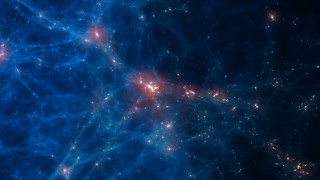Bibcode
Trayford, J. W.; Theuns, Tom; Bower, Richard G.; Schaye, Joop; Furlong, Michelle; Schaller, Matthieu; Frenk, Carlos S.; Crain, Robert A.; Dalla Vecchia, C.; McCarthy, Ian G.
Referencia bibliográfica
Monthly Notices of the Royal Astronomical Society, Volume 452, Issue 3, p.2879-2896
Fecha de publicación:
9
2015
Número de citas
236
Número de citas referidas
230
Descripción
We calculate the colours and luminosities of redshift z = 0.1 galaxies
from the EAGLE simulation suite using the GALAXEV population synthesis
models. We take into account obscuration by dust in birth clouds and
diffuse interstellar medium using a two-component screen model,
following the prescription of Charlot and Fall. We compare models in
which the dust optical depth is constant to models where it depends on
gas metallicity, gas fraction and orientation. The colours of EAGLE
galaxies for the more sophisticated models are in broad agreement with
those of observed galaxies. In particular, EAGLE produces a red sequence
of passive galaxies and a blue cloud of star-forming galaxies, with
approximately the correct fraction of galaxies in each population and
with g - r colours within 0.1 mag of those observed. Luminosity
functions from ultraviolet to near-infrared wavelengths differ from
observations at a level comparable to systematic shifts resulting from a
choice between Petrosian and Kron photometric apertures. Despite the
generally good agreement there are clear discrepancies with
observations. The blue cloud of EAGLE galaxies extends to somewhat
higher luminosities than in the data, consistent with the modest
underestimate of the passive fraction in massive EAGLE galaxies. There
is also a moderate excess of bright blue galaxies compared to
observations. The overall level of agreement with the observed colour
distribution suggests that EAGLE galaxies at z = 0.1 have ages,
metallicities and levels of obscuration that are comparable to those of
observed galaxies.
Proyectos relacionados

Astrofísica Numérica: Formación y Evolución de Galaxias
Entre las cuestiones fundamentales en Astronomía y Astrofísica están la formación y evolución de galaxias. Las escalas de tiempo y tamaño son tan astronómicas que su observación en galaxias individuales es imposible. Solo con el uso de simulaciones numéricas es posible entender la formación de estructuras cósmicas dentro del actual marco
Claudio
Dalla Vecchia